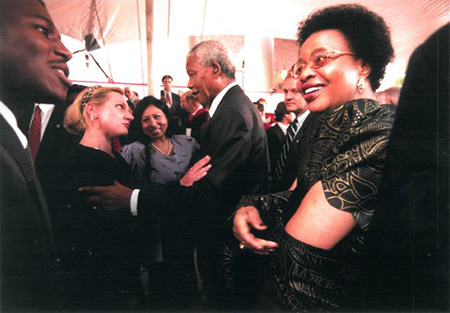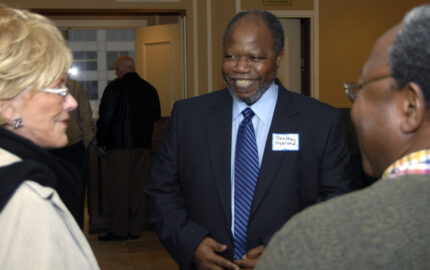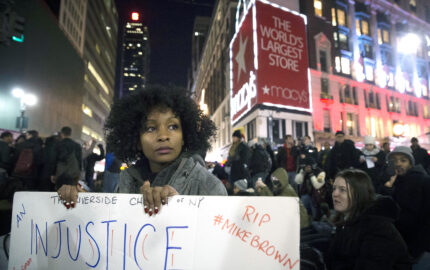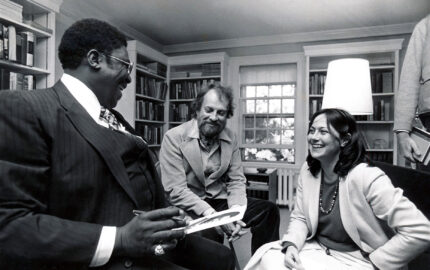Shortly after he turned 80, Nelson Mandela received an honorary doctorate from Harvard at a special convocation.
“I know that through this award, you are not so much recognizing any individual achievement, but are rather paying tribute to the struggles and achievements of the South African people as a whole,” he said in his address. “To join George Washington and Winston Churchill as the other recipients of such an award conferred at a specially convened Convocation is not only a singular honor. It also holds great symbolic significance to the mind and to the future memory of this great American institution; the name of an African is now added to those two illustrious leaders of the Western world.”
It was typical Mandela to say that the award did not recognize “individual achievement.” It reflected both a humility rare in politicians but also a constant refrain both at home and abroad that he should not be seen as separate from his organization, the African National Congress.
His humility was not a modesty; it always went with an extraordinary self-confidence and pride. Yet it was born of an impatience he often showed to politicians too comfortable with power.
In this week of his passing, the world’s media has been inundated with accounts of personal encounters with him: from political leaders to people he met on airplanes to sportsmen and workers.
At a memorial service at the University of Pretoria this week (where Mandela was prevented from speaking in 1992), professor Piet Meiring, a minister from the Afrikaans Dutch Reformed Church, recalled a story Mandela had told him. As he was being driven to his residence in his first days of office, he noticed a scuttle of movement in the hedges. The driver told him it was one of the gardeners who had strict orders not to be seen by the president.
The next day he alighted from the car, and ran into the garden where he found a gardener hiding behind a hedge. The gardener was mortified at being seen, but Mandela insisted on asking them all to tea that week. Once he had gathered them, he asked if they had ever seen “their” garden. He took them outside where a helicopter was waiting to take them up for a bird’s eye view. What line-item on the national budget this fell under is not clear. But it was a typical Mandela gesture.
At the time Mandela came to Harvard, I was a Nieman Fellow, and privileged enough, as a South African, to be invited to sit on the platform. I had covered his presidency quite extensively by then for both the public broadcaster and a Sunday newspaper, and had spent several days with him around the time of his 80th birthday. He recognized me as he finished his speech, approached me and hugged me. “Pippa,” he said, pronouncing it “Peepa.”
“What are you doing here?” When I told him he chuckled. “Harvard. You will be too important to come and see me when you get back.”
He was breathtaking in his combination of charisma and old-fashioned courtesy. Often this was part of deliberate strategy. He had told me in an interview a few months before that on his first day in office in 1994, that he had found no staff there. He phoned an aide and asked him to gather the staff the next day.
There is a U-shaped cabinet room in the Union Buildings in Pretoria, the seat of the executive. It was there that the staff filed in, the black staff sitting in the inner circle, and the white staff occupying the outer one.
“I came in without greeting them,” Mandela recalled. “I could see their insecurity and at times hostility. Just for effect, I stood and looked at them.”
Then the new president approached a white woman in the outer circle and said: “Do you mind if I shake your hand?” He asked her name, whether she was married, if she had children, never letting go of her hand. “It took me more than hour to greet them all.”
When he was done, he asked: “Are you aware that a new government has taken over?”
I wrote at the time that if this was a revolution it was one of the most courteous in history.
It took just a few months before he commanded complete loyalty from his staff. He would send messages to his bodyguards at functions asking whether they had eaten. He invited staffers to the official state banquet he held for President Bill Clinton as VIP guests.
Mandela was president for only five years—one term. But in that time he turned heads and hearts and minds, not only of white and black South Africans, but of the world.
He always refused to be sucked into the pomp that went with power and he delighted in bringing potentates down a little. He would walk surprised visiting heads of state out of press conferences and across the lawns of his state office to the fence which lined Government Avenue, a famous pedestrian walkway in Cape Town, where he would introduce them to delighted passersby. Once, when I had gone to his Cape Town residence to do an early morning interview, I encountered Jesse Jackson on the way out. Mandela called me back into the room to introduce, not me to Jackson, as protocol would have it, but a visibly astonished Jackson to me. “She’s a reporter,” he said, as though it were akin to being a rock star.
When I asked him once what he thought his greatest achievement as president was, he replied with an anecdote about humility.
A member of the ANC’s national executive committee in exile who was, in Mandela’s words, “already getting off his rocker,” once attended a state ceremony in Mozambique. Mozambiquan President Joaquim Chissano was there. But the ANC member did not recognize him and dispatched him to fetch “a comrade.” And Chissano politely agreed to do so.
This, according to Mandela, was the mark of leadership.
Humility and power are a rare combination. But Mandela showed it at Harvard in 1998. He has shown it in his death in 2013.



